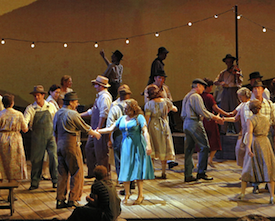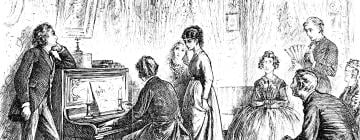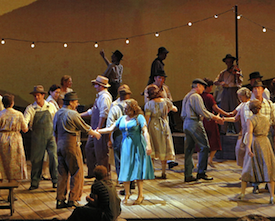
Photo by Cory Weaver
San Francisco Opera's 92nd season had a great start, featuring Sondra Radvanovsky in Norma and Patricia Racette in Susannah. A few random notes about the opening weekend and its heroines:
Opera Medal to Racette
This season marks Racette's 25th anniversary with the company — she was in the Merola Program, her first mainstage performances were a Priestess in Aida and the Voice of the Falcon in Die Frau ohne Schatten; her first featured role was Alice Ford in the 1989 Falstaff.
Following the Sept. 21 performance of Susannah, Racette will receive the San Francisco Opera Medal, the highest honor the company bestows. Among former recipients: Dorothy Kirsten (1970), Leontyne Price (1977), Joan Sutherland (1984), Marilyn Horne (1990), Plácido Domingo (1994), Charles Mackerras (1995), Frederica von Stade (1997); most recently, James Morris (2001), Samuel Ramey (2003); former San Francisco Opera General Directors Kurt Herbert Adler (1978), Lotfi Mansouri (2001), and Pamela Rosenberg (2005). In 2008, on the occasion of his 30th anniversary with the company, Director of Music Operations Kip Cranna received the Opera Medal; former San Francisco Opera Music Director Donald Runnicles (2009); and in 2012, chorus director Ian Robertson.
The Indestructible Diva
Not a footnote, but the story of a broken toe, an old story about Radvanovsky, except it's new to me. According to a 2009 story in Chicago Classical Review, she sang Elvira in Lyric Opera of Chicago’s new production of Verdi’s Ernani with a five-pound cast on one leg and a broken toe on the other, both injuries incurred in our city:
The cast is for a ligament torn after struggling with a purse snatcher in San Francisco Oct. 3. The broken toe occurred three days later onstage at the San Francisco Opera where she was singing Leonora in Verdi’s Il Trovatore. It was the final performance of the run. As Manrico fell to his knees near the fair Leonora, tenor Marco Berti landed on Radvanovsky’s foot, breaking the little toe on her left foot.
...
Torn ligaments and broken toes pale compared with a health problem that Radvanovsky struggled with several years ago. Speaking publicly about the subject for the first time, she revealed that she had surgery on her vocal cords in 2002.
Dripping and Spitting at the Opera
From the SFO Norma press notes:
In the Adelphi Theater, the touring Pellegrini Opera Company presented Norma on Feb. 27, 1851, 20 years after its La Scala premiere. It was the second opera ever performed in the city, after Bellini's La Sonnambula given earlier that month:There was no women's chorus, men's chorus consisted of six people; there were some 15 musicians in the orchestra. The theater had about 1,000 seats. the lighting was by candles and whale oil; the musicians had the duty of trimming the wicks during a performance.
The auditorium chandelier, once lit, was raised to the ceiling, from where it dripped wax on the orchestra seats. People seated there kept their hats on ... there was a chandelier on stage, too, which necessitated the most of the singers wear hats as well.
Peanuts and fruit were sold in the aisles, smoking cigars in the audience was permitted. Tobacco chewers were asked to spit on their own shoes, not on those of the people seated next to them.
Orchestral Observations
The flute solo introduction to "Casta diva" at the Friday night Norma was by Julie McKenzie, a perfect pairing with Radvanovsky's glorious performance.
The violinist on stage Saturday in the Act 1 square dance scene of Susannah was the orchestra's Craig Riess, stepping along with the do-si-do.
The 'Mainstage' Qualification
The reason for saying Susannah's 59-year-delayed premiere at San Francisco Opera is on the "mainstage" is that the company's Spring Opera Theater presented it in 1964 (with Norman Treigle, the greatest Rev. Blitch), and Western Opera Theater did in 1977.
The Other Norma
Strangely enough, a work with a cast of Norma, Adalgisa, Severus, Ariovist, and Norma and Severus' two sons, Druides and Druidines, is a 1851 play of political satire by Henrik Ibsen, using characters from Bellini's opera. Who knew?
Read Up on Susannah
When you go to the website on Susannah, if you scroll down some and click on "Program Information," you can read essays about the composer, the opera, and Racette by Beth Levy, Michael Cavanaugh, Robert Wilder Blue, and Roger Pines.
An excerpt from the article about Carlisle Floyd:
In 1952, Floyd met Nathan S. “Sam” Blount, a graduate English student at FSU. Blount suggested they team up as librettist and composer and offered the idea of an opera based on the biblical Apocrypha story of Susanna and the elders. Blount and Floyd identified with the story of a heroine who was wrongly accused, a timely parallel in that era of McCarthyism and patriotic paranoia.Floyd was attracted to the subject because it focused on religious hypocrisy. “It struck fire immediately. We had the idea of updating the action and placing it in the remote Tennessee Valley during the summer revival meetings.” But, Blount procrastinated and did not present a draft of a libretto. Floyd was so anxious to get moving on the project, he wrote his own libretto in ten days.
Looking back on his life up to that point, Floyd seemed destined to write Susannah. “I suppose I was,” said Floyd. “I drew on many aspects of my own experience for it.” Floyd was well familiar with the conservative teachings of the Methodist church and had been forced to attend revival meetings as a child. He had grown up among self-righteous adults who were quick with a judgmental comment or a critical remark, his father providing the closest example.
Floyd completed the score in March, 1954. “With the confidence of a 27-year-old,” recalled Floyd, “I went to Karl Kuersteiner, dean of the School of Music at Florida State, and told him I’d written an opera and I’d like to see it done there. It’s the kind of brashness you have when you begin a career [he laughs].” Kuersteiner was impressed with Susannah and gave Floyd the authority to engage professionals in the lead roles.

